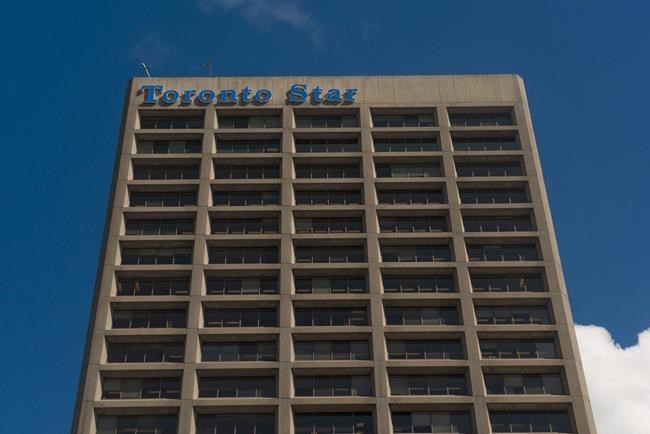TORONTO — Torstar Corp. lost $23.5 million in the first quarter as revenue dropped 20 per cent from the same time last year amid a decline in advertising and flyer distribution, the print and digital publisher said Wednesday as it released quarterly results and held at a virtual shareholders meeting.
The company, which owns the Toronto Star and other newspapers, said it has made progress on a long-term transformation of its business toward digital publication but faces significant pressure on revenue as businesses cut back on advertising amid the COVID-19 pandemic.
Torstar chief executive John Boynton said that public interest in the COVID-19 health crisis and economic slowdown resulted in "a significant increase in digital traffic to our sites, beginning in March and continuing into the second quarter."
Unfortunately for Torstar, this increased traffic has not driven digital advertising revenues because some marketing digital giants, which Boynton didn't identify, have blocked the placement of ads on any sites that even mention COVID-19 due to brand safety concerns.
"We ask chief marketing officers, agency CEOs and CEOs at companies to review their blacklist policy with an eye to a more reasonable execution that allows ads on sites that may have the word COVID-19 but also carry all kinds of stories associated with that," Boynton said in a speech to Torstar's shareholders meeting.
He said there is "a collective responsibility" to ensure that trusted sites aren't handicapped during the crisis.
Boynton said that Torstar management has undertaken a number of cost-reductions since the pandemic to keep its expenses in line with reduced revenue.
Torstar in April announced 85 permanent layoffs across the organization. It said Wednesday that it expects the job cuts will produce $7 million of annualized savings from that initiative. It has also frozen discretionary spending, for a $5 million reduction for the full year.
Torstar's operating revenue fell to $92.5 million for the three months ended March 31, down 20.2 per cent from nearly $116 million a year earlier, due to the impact of the measures taken to slow the spread of COVID-19 started in mid-March as well as the closure of StarMetro print editions in late December.
Excluding the impact of the closure of StarMetro print editions in late December, Torstar said its first-quarter operating revenues were down 17 per cent.
The impact of the COVID-19 pandemic was illustrated by a 58 per cent decline in print advertising revenue in the latter half of March on a same-store basis, compared with a 29 per cent decline for the quarter as a whole.
In addition, flyer distribution revenues fell 27 per cent in the latter half of March and digital advertising revenue declined about 12 per cent.
On a more positive note, Torstar said print subscription revenue hasn't been significantly impacted by the COVID-19 pandemic to date, while digital-only subscription growth accelerated near the end of the quarter and has continued into April.
"In the balance of 2020, we anticipate that modest declines in print subscription will continue and that these will be partially offset by growing digital-only subscription revenue resulting in modest declines in overall subscription revenue."
The company said its first-quarter net loss attributable to shareholders amounted to 29 cents per share compared with a net loss of $7.4 million or nine cents per share a year earlier.
On an adjusted basis, Torstar says it lost 13 cents per share compared with an adjusted loss of six cents per share in the first quarter of 2019.
Analysts on average had estimated $109 million of revenue and an adjusted loss of seven cents per share, according to financial markets data firm Refinitiv.
Torstar says it expects to receive $12 million for the first eight weeks of the federal emergency wage subsidy for companies affected by COVID-related revenue losses and expects to qualify for about $6 million more for the remaining four weeks of the program.
It also noted an increase in print and digital advertising related to COVID-19 public service announcements, by government agencies and some other advertisers, as well as $11.9 million in tax credits from prior provincial government programs to defray the cost of journalism salaries.
This report by The Canadian Press was first published May 6, 2020.
___
Torstar holds an investment in The Canadian Press as part of a joint agreement with subsidiaries of the Globe and Mail and Montreal's La Presse.
Companies in this story: (TSX:TS.B)
David Paddon, The Canadian Press

